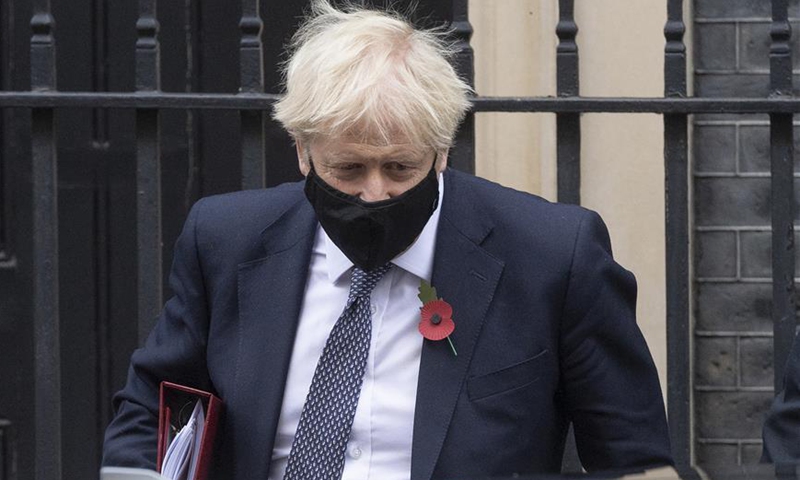UK PM warns against easing efforts to fight COVID-19 amid vaccine hopes
Source: Xinhua Published: 2020/11/10 10:34:59

British Prime Minister Boris Johnson leaves 10 Downing Street for Prime Minister's Questions at the Houses of Parliament in London, Britain, on Nov. 4, 2020. British lawmakers on Wednesday voted in favor of the government's a month-long lockdown for England by 516 votes to 38, a majority of 478.Photo:Xinhua
British Prime Minister Boris Johnson on Monday warned against relaxing efforts to fight the coronavirus pandemic amid looming hopes of a vaccine.
"We cannot rely on the news about a vaccine as a solution" in fighting the COVID-19 pandemic, Johnson told a virtual press briefing at the Downing Street.
"It would be a mistake to slacken our resolve in fighting the virus," the prime minister said.
Mass testing can be a substitute to the restrictions, he said while briefing the whole country on the current coronavirus situation in the country amid vaccine hopes.
It is more important than ever that people follow the lockdown rules, Johnson said.
England last week entered into a month-long national lockdown, the second of its kind since the coronavirus outbreak in Britain, in a bid to quell the resurgence of coronavirus.
"Hands, face, space. Follow the rules -- that's how we can protect the NHS (National Health Service), save lives, and get the virus back in its box," Johnson said.
A vaccine candidate jointly developed by the German pharmaceutical company BioNTech SE and the U.S. company Pfizer Inc. has proved to be more than 90 percent effective in preventing COVID-19 infection in participants with no proven previous SARS-CoV-2 infection, the two companies announced on Monday.
"We've cleared one significant hurdle but there are several more to go before we know the vaccine can be used," said Johnson.
Joining Johnson for the press briefing, Deputy Chief Medical Officer for England Jonathan Van-Tam noted that "this is really a very important scientific breakthrough."
However, he said it remains unclear if a vaccine, if becomes available, will return life to normal.
"The one thing we know at the moment is that the vaccines will prevent illness. We do not know yet if these vaccines will prevent asymptomatic infection and therefore we do not know if these vaccines will prevent virus shedding, and therefore have an effect on community transmission."
Van-Tam said if a safe and effective vaccine can be deployed in elderly populations, "I'm hopeful we will see a dramatic decline in the burden on hospitals."
"But it can't happen all at once -- we don't have the vaccine yet, they are not authorised yet, it will take time to roll out," he added.
As the world is struggling to contain the COVID-19 pandemic, countries including Germany, China, Russia, the United Kingdom and the United States are racing against time to find a vaccine.
According to the website of the World Health Organization, as of Nov. 3, there were 202 COVID-19 candidate vaccines being developed worldwide, and 47 of them were in clinical trials. Enditem
Posted in: EUROPE